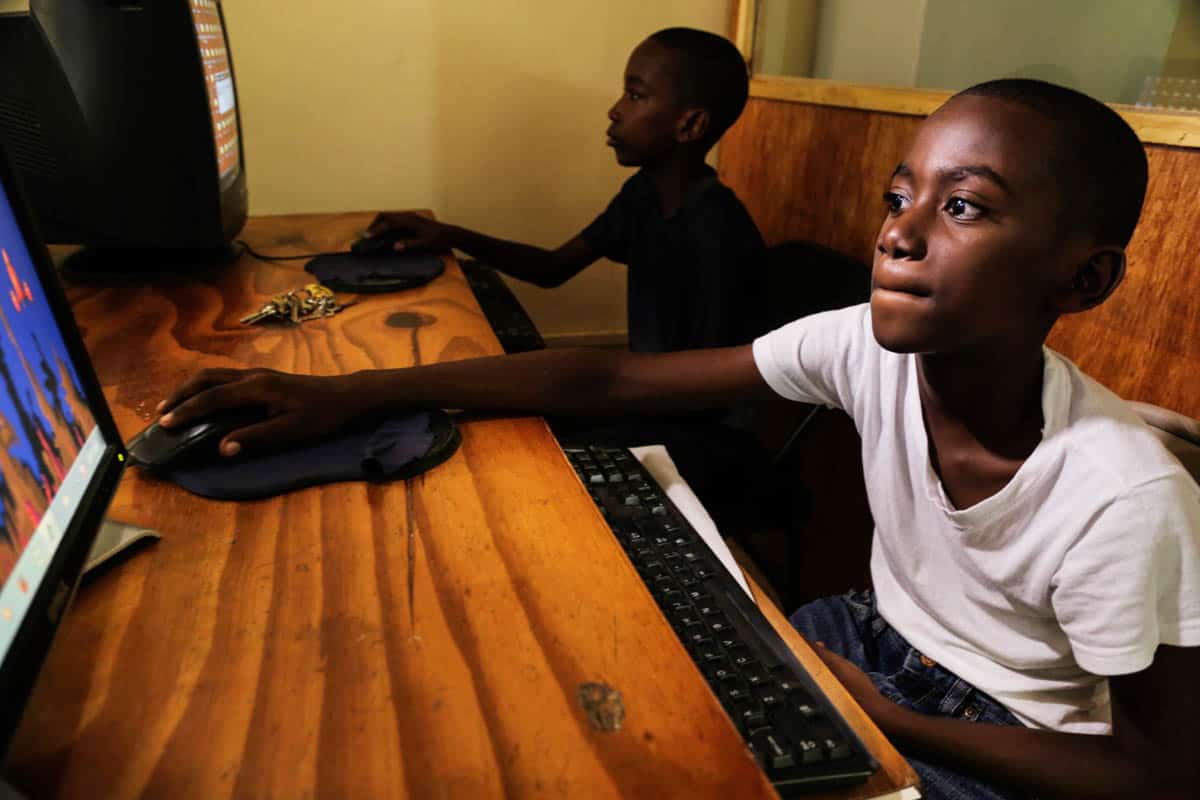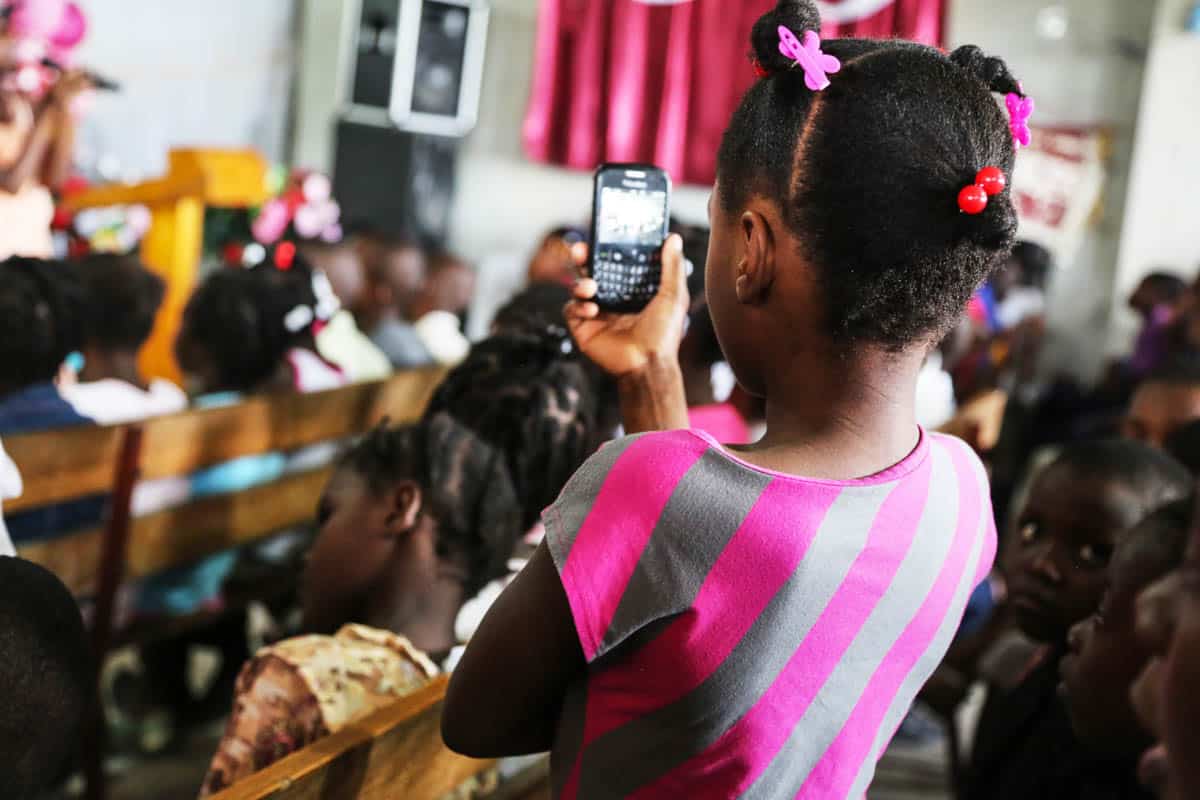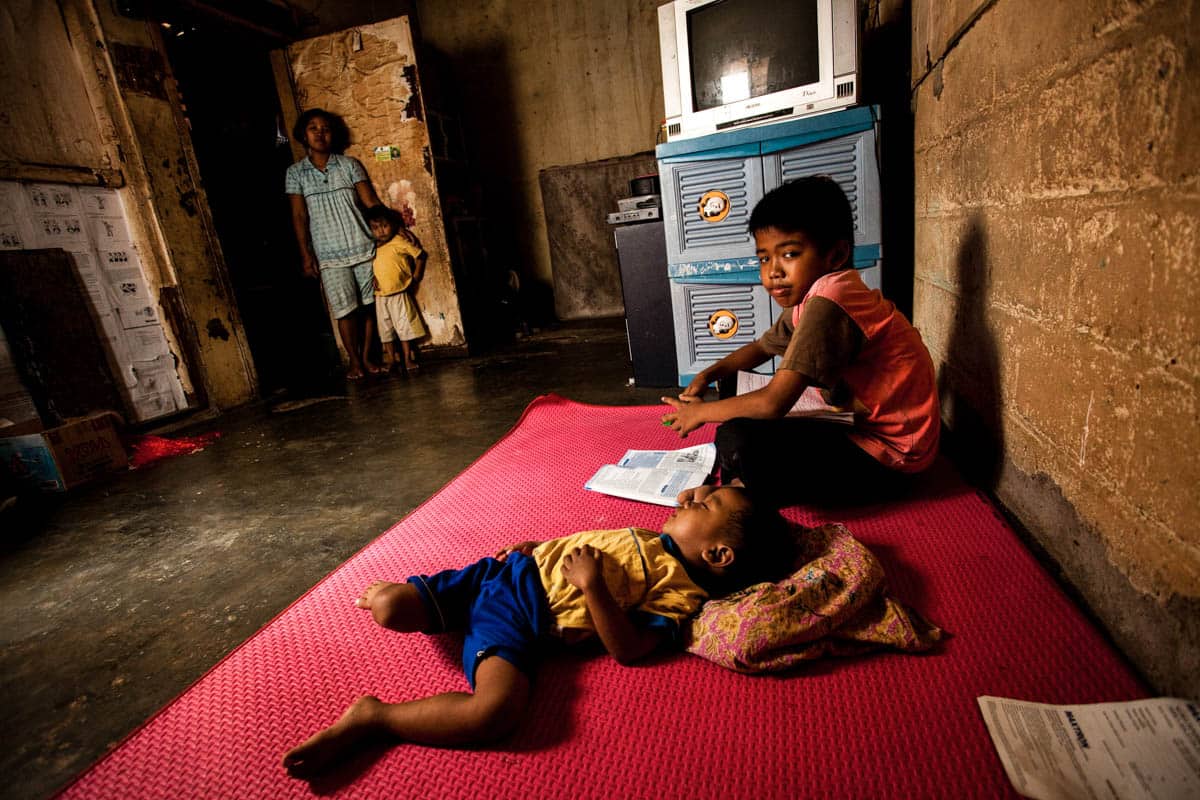Compassion sponsor, Laura, posted this suggestion on our community support page a while back in reference to technology in developing countries:
“Our family has sponsored since the 1990s…In the past year or two we’ve been hearing more and more about sponsored children (especially teens) having access to Facebook, cell phones, etc. and having televisions and video games in their homes. Our family cuts some costs by not owning Smart Phones, not paying for cable TV, etc., so it is hard for us to understand why families in Compassion’s programs would have what we consider to be luxuries, when physical and educational needs are not being met without help from Compassion sponsorship.”
Over the last few years, I have heard this concern from many other sponsors about their sponsored children’s access to technology. I will try to respond to this concern by sharing a little about the way people in the developing world view and acquire technology.
Why would my sponsored child’s family have these “luxuries” when they are struggling to meet basic needs?
This is the kicker – the question I get over and over. The simple answer is that families in developing nations do not view cell phones and other technology as luxury items. They view technology as a needed tool for survival. And they can acquire these tools for much less than we think.

The Internet
It’s very common for children in our programs to have access to the Internet. However, it’s important to clarify that, for the most part, they do not have computers and Internet access at home. Most get access somewhere else in their community.
Internet cafés, where Internet use can cost as little as pennies per minute on a public computer, are common. Also, many of our student centers have computer labs with Internet access in order to teach valuable vocational skills. And some developing countries have government programs that will provide technology, like tablets or Internet access to students.
Social Media
Once people are online, they overwhelmingly adapt to social networking because Facebook, Twitter and other social media sites are free. Many adolescents in our program have social media profiles just like kids might in developed countries like the US.
While teens are taught to never contact their sponsor on Facebook or Twitter, many of them are very curious about their sponsor – especially if they haven’t had much contact with them through letters or photos. They may “Facebook stalk” their sponsors to try to see who they are.
And that curiosity may lead to a friend request, even though it is against the rules. If you receive a friend request or other contact from your sponsored child on social media, it is important to ignore that request for the protection of both you and your child.
Vanity is common on social media no matter what country you live in – we all want our lives to look better online than they really are. This is why sponsored children in developing countries will often borrow someone else’s camera or use their own cell phone (more on that below) to take pictures of themselves standing in front of a public building, instead of the slum they really live in.
For this reason, you may notice that in your sponsored child’s social media profile, he or she appears to be standing in a nice neighborhood or area.

Cell Phones
The developing world is skipping over one hundred years of building telecom infrastructure. Basically, instead of starting with land lines, they are skipping development and going straight to mobile phones.
This is particularly evident in Africa, where just a sliver of the population has a landline due to monopoly, corruption, and bad management of the nationally owned telephone companies that never took off. Then you see Maasai tribe members in Kenya herding cattle…with cell phones held to their ears.
The cell phone market from the get-go has been much more competitive by marketing to the poorest in the population and offering low-priced cell phones (often Chinese knock-offs) and prepaid SIM cards.
This means that people can pay a dollar or less and have access to phone calls, texts and even the Internet on a phone for a limited time. They pay as they go, and only pay what they can afford.
Innovations like Kenya’s M-PESA, which helps cell phone owners easily and securely send money, are significant. In some ways, new technologies are progressing faster in developing countries, and they are allowing people to do business more safely and improve efficiency.
During the political instability in 2008, M-PESA became especially useful. People could confidently store and send their money on their phones at a time when many banks were unstable due to ethnic tensions. Many of our centers in Kenya use M-PESA to make money transfers for staff salaries and support for children
Without land lines, 911 emergency lines and ambulances, a simple cell phone can be a life-saving alert system and access to emergency assistance from others in the community when needed.
Barrack Okal, who helped develop much of the technology systems that we use in eastern Africa, told me a story of someone living in the country who texted their doctor to see if they needed to go to the hospital. Once it was determined that it was an emergency situation, they were taken to the hospital in a wheelbarrow.

Television
Similarly, old tube televisions or radios can be acquired inexpensively. They can be a crucial means of receiving warning signals during natural disasters or weather forecasts that inform agricultural decisions like when to plant and harvest.
A TV can also provide a form of education or entertainment that was not previously available to the family. I saw this personally when staying with middle class families in eastern Africa. Libraries are nowhere to be found and books can be difficult to acquire.
A box of colored pencils may be very expensive at the local market, and the family may not have money to buy toys for their children. We provide coloring supplies and a safe place for kids to play at the center but what do kids do on school breaks?
I know many scorn the idea of propping kids in front of the television. However, in dangerous areas, when impoverished parents are not able to watch their children all the time, television is a safe and relatively educational option.
If you consider the low cost of many of these technologies and the lack of other community resources that we take for granted, you can start to see how technology in developing countries can be seen as an important tool for survival.
And when wisely deployed, it can provide a multitude of benefits that keep people safe, connected and informed — all important steps in the path out of poverty.
This article was originally published March 27, 2015.







23 Comments |Add a comment
I live in a sponsored country but I am sponsoring a child through Compassion. I believe most of you know only smartphones that are produced by international established technology companies. In the sponsored country, they are so many smartphones from China that are very cheap that their price are as high as your t-shirt’s price. So, cellphones are not considered luxurious devices anymore, but they are more about their functions as sources of information and education.
Could I call my sponsor child and even email her? she lives in mexico and so the Spanish part will not be a problem plus there is Google translate
Addy, we kindly ask that you please do not try and contact your child through phone, email, or other social media. Compassion has policies in place to protect both you and your child and the only way we can ensure the safety of both parties is to have communication with your child stay solely within Compassion. You can read our blog about Facebook that elaborates further on why this type of communication can develop into potential problematic situations. Although it’s discussing Facebook specifically, the same concerns apply to all communication outside of letter writing that is first filtered through our office. We appreciate the difference you’re making in your child’s life and the encouragement and love you send to her through your personal notes and cards to her :).
Loved this article!! Such helpful information and perspective. Thank you!
Here is an interesting TED talk that covers some of the same topics. It’s amazing what you can do with a relatively simple technology like SMS texting.
https://www.ted.com/talks/toby_shapshak_you_don_t_need_an_app_for_that?language=en
I’ve been communicating with my sponsored child via Facebook for a long time now; I had NO idea this was not permitted/encouraged! But… NOW what do I do?
Hi Erin! I see that your family has been faithful sponsors with us for over 12 years and you support several children with us. If you post your child’s number here (or email us at socialmedia@compassion.com), we can contact the project workers at the center your child attends. They will meet with your child to remind them of the guidelines and that it’s important to only communicate with you through letters. In the meantime, I would encourage you to stop communication with your child over Facebook. I understand that Facebook is much quicker and is tempting with the length of time it takes to deliver letters back and forth, but in order to ensure the safety of you and your child, we appreciate you helping us out with this! We are currently working on updating our systems and finding quicker ways of communicating with your child, so stay tuned! 🙂
This was a great article! I have wondered about this myself. What are your thoughts about a FORMERLY sponsored child contacting us on Facebook? One of the children I had sponsored in the past (now graduated from the program) has friended me on Facebook.
Hi Linda! It is up to your discretion and discernment to make this type of contact with your child once they graduate. I would encourage you to read my response to Rebecca in this conversation as she asked a similar question :).
Excellent post, Technology in is what is helping us get out of poverty, without we would be worse off.
If we’re allowed to send photos and letters to our child, why are we not allowed to contact them on social media?
Krista, when you send letters and photos to your child they are first filtered through our office in Colorado. We are able to monitor the content being sent and ensure that it’s safe and appropriate for the child and that personal contact information is not being given. If there is ever items or letters we cannot send through, we contact you to let you know. The same goes for when your child writes you a letter. Also, when your child writes you a letter we can guarantee and confirm the person who wrote your letter whether it be a project worker, guardian, or your child if they’re old enough to write. If you’re communicating with your child on social media, Compassion cannot guarantee it’s your child that your talking to. We are committed to confidentiality and privacy and we can only protect both parties if the communication is solely through Compassion.
I disagree I would not ignore my sponsor child request for friendship ,, absolutely not what a wonderful way to converse with them and why would you want us to ignore it that’s wrong that’s rude and feels deceptive what are you hiding why would you want me to do that that doesn’t even sound right if you want us to encourage them to stick to the guidelines where they’re not asking for money and that sort of thing that’s fine, but to tell us to ignore that, I don’t think that’s right.
Tammy, please know that we are not asking this to deceive you in any way. We truly value your relationship with your child and it’s a priority of ours to take necessary precautions to protect both our children and our sponsors from problematic situations that can arise through direct communication. I understand that it can seem cold or harsh to ignore a friend request from your child but since we cannot guarantee that the person contacting you is actually your child and we cannot monitor the content passed back and forth, this is one way that we are able to protect the privacy of you and your child. If you add your child or message them even just to say that you cannot add them as a friend, it opens up a door that can lead to your child being tempted to go against our guidelines and respond to you. This is why we ask you to let us know when a child sends you a friend request; so that we will have the opportunity to meet with the child and family to gently remind them of the guidelines. This way, your child will not feel ignored by you and will also not be breaking the rules we have in place. I would encourage you to read our blog about why we do not allow communicating with your child through social media (Facebook specifically) as it gives helpful insight and further elaborates on the risks involved.
And isn’t the whole point of this to help get them out of poverty? So let’s be happy that they’re making advancements.
Are we allowed to friend the child on Facebook once they reach adulthood and graduate from the program?
Rebecca, we cannot guarantee that the person you find on Facebook will actually be your child and so we strongly discourage this type of communication due to privacy and safety concerns. However, once a child graduates from our program the communication is outside of Compassion’s oversight and is no longer monitored for content. It will be up to your discretion but we encourage you to prayerfully consider it before friend requesting a child.
It baffles me that anyone still considers internet access a “luxury.”
I consider Internet access a luxury.
I love in the country where there are many places you cannot get internet. This is in the US!
What baffles me is why people in developed countries with existing infrastructure finds the Internet to be so necessary! Life does go on without facebook!
LOVED this post Susan! One of the things that keeps people in the developing world from getting out of poverty is the lack of technology. To compete with the world, this generation of children need to know how to use computers and cell phones. I really like how you addressed those needs in your post.
Thank you for sharing this information.
Great article as these questions are asked so often. I do wonder how much the projects talk to the kids about not contacting us though, because I sure have had quite a few of them try.
Hi Debbie! If the project knows that your child is communicating with you through social media, they will gently remind them of the guidelines and also discuss this with their guardians. Please let us know when these instances occur and we will contact the center your child attends to make sure they’re aware.